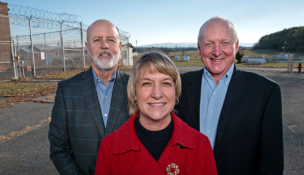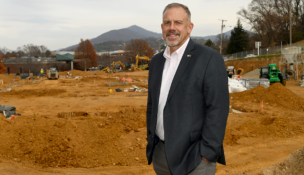
Transco compressor station in Chatham. Photo by Hannah King

Transco compressor station in Chatham. Photo by Hannah King
Transco pipeline to expand for Virginia power demand
Summary
- Transco pipeline to carry 950M more cubic feet of gas daily
- Expansion targets power needs north of Station 165 in Chatham
- Project aims to use existing rights of way to ease permitting
- Increased gas supply supports Virginia’s AI and manufacturing growth
In May, Tulsa, Oklahoma-based energy company Williams announced an expansion of its Transcontinental Gas Pipe Line, a move designed to help meet Virginia’s voracious appetite for power.
Currently extending 10,000 miles from South Texas to New York, the pipeline, better known as Transco, will be expanded to carry an additional 950 million cubic feet of natural gas daily, said former Williams President and CEO Alan Armstrong on the company’s May 6 first-quarter earnings call. (On July 1, Armstrong became executive chairman of Williams’ board, with Chad Zamarin succeeding him.)
The expansion will serve areas north of Transco’s Compressor Station 165 in Chatham.
“The project is backed by a significant commitment from an anchor shipper and will utilize existing [rights of way] and infrastructure to dramatically reduce permitting risk and provide scalability,” Armstrong said during the May call.
A Williams spokesperson declined to elaborate further, stating that the project is in its early development stage. In May, the company noted it expects what it’s calling the Transco Power Express expansion to be operational by the third quarter of 2030.
In Virginia, the current Transco pipeline runs from Danville through Appomattox and Buckingham counties and into Northern Virginia, according to Glenn Davis, director of the Virginia Department of Energy. Davis says he’s had preliminary discussions with Williams about the Transco expansion.
“There will be significant benefits for surrounding counties and cities as well,” Davis says. “If this is using existing [rights of ways], obviously there’s going to have to be some trenching, but the benefits greatly outweigh any inconvenience.”
As of late June, Williams had not filed any documents with the Virginia State Corporation Commission, according to Greg Weatherford, deputy director of information resources. Williams also had not filed anything with the Federal Energy Regulatory Commission.
Kenneth Bowman, a member of the Pittsylvania County Board of Supervisors representing the Chatham-Blairs District, did not respond to a request for comment.
The commonwealth’s thirst for power comes from a variety of growing industries, including advanced manufacturing, according to Davis. But data centers, especially ones supporting artificial intelligence operations, are also consuming a significant and growing amount of energy.
“We’re very excited about the economic development opportunities this could bring to various parts of Virginia,” Davis says.
g



















